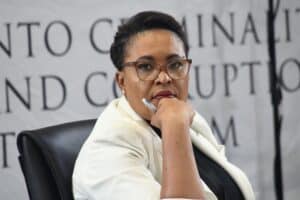Magashule says the matter was an internal issue and that 'as you approach elections, you go into a war room'.

In a move that was radically different from Nomvula Mokonyane’s announcement during the 2016 local government elections campaign, when she announced its costs hovered around the R100-million mark, secretary-general Ace Magashule this afternoon refused to disclose how much the party would be spending in the run-up to the 2019 elections.
Asked if the party had adequate funding to run its elections campaign against a background of diminishing party support that threatened its parliamentary majority post-2019 national and provincial elections, Magashule refused to be drawn into the matter.
He told journalists in Cape Town during post-NEC press briefing that the matter of how much the ruling party would spend on the upcoming elections campaign, this time headed by former police minister Fikile Mbalula, was an “internal matter” and that the party would once again use the “war-room” strategy.
In 2016, the party was embroiled in a “war room” scandal when public relations strategist Sihle Bolani took the party to court and lost in her bid to be compensated for the work she did behind the scenes in the “war room”.
News24 reported in January 2017 that former general manager Ignatius Jacobs scolded the war-room architects for promising several service providers that they would be able to raise R50-million to pay for covert operations.
RELATED: R200m ANC debt Mashatile’s biggest headache
It was revealed at the time that this strategy primarily involved using “influencers” and social media, particularly twitter users with a huge following, to tweet pro-ANC messages in the months leading up to the August municipal elections in 2016. The party was also heavily criticised after amaBhungane revealed it was involved in a covert campaign targeting opposition parties before the municipal election.
The state of the ruling party’s finances has long been a matter of speculation, as political parties are not strictly required, legally speaking, to reveal their audited annual financial statements, except where allocations from parliamentary work are concerned. During the elective conference held in Nasrec in December 2017, former treasurer-general Zweli Mkhize told the media the party ought to restructure itself to save costs.
Magashule also assured the media that after Parliament’s ad-hoc committee on the funding of political parties approved the political party funding bill in November 2017, the bill would be passed into law during an ordinary Parliament sitting tomorrow.
In the bill, the committee recommended that the Represented Political Party Fund and the proposed multiparty Democracy Fund be managed by the Independent Electoral Commission (IEC). It further proposed that the two funds should be managed by a separate business unit, with its own chief executive.
Support Local Journalism
Add The Citizen as a Preferred Source on Google and follow us on Google News to see more of our trusted reporting in Google News and Top Stories.








